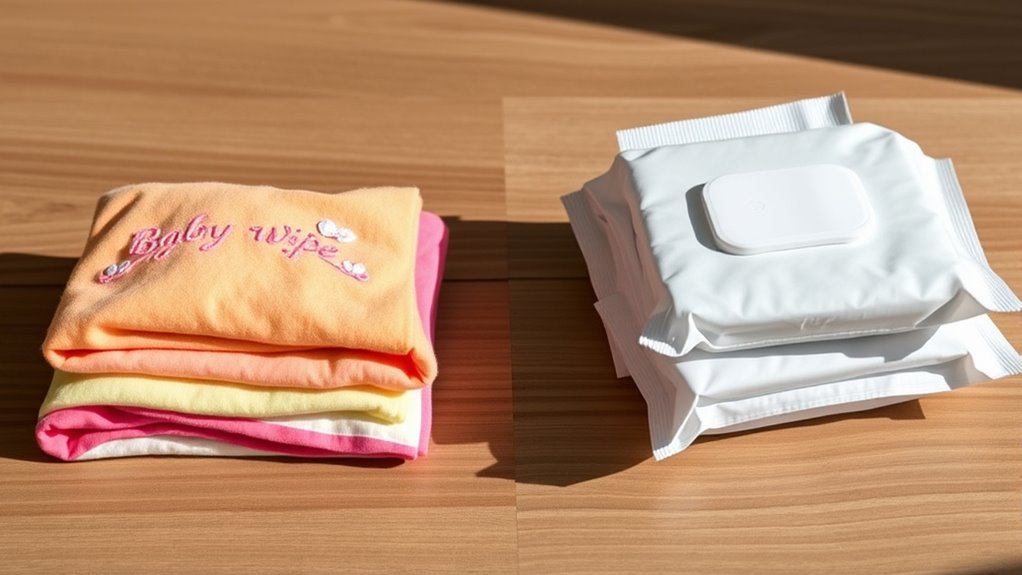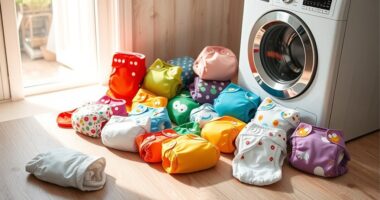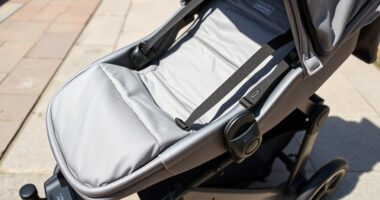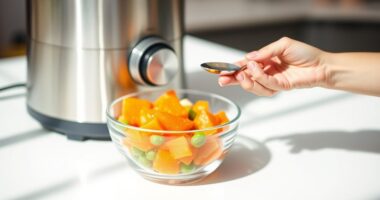Choosing between reusable and disposable baby wipes depends on your priorities. Reusable wipes are eco-friendly, cost-effective over time, and made from natural fabrics that decompose faster, reducing pollution. However, they require washing and extra effort. Disposable wipes offer convenience with no prep but contribute to landfill waste and use more packaging. By understanding both options, you’ll find the best fit for your family and the environment—keep exploring to learn more about their differences.
Key Takeaways
- Reusable wipes are eco-friendly, decomposing faster and reducing landfill waste, unlike disposable wipes that contain synthetic fibers and chemicals.
- Reusable wipes have a higher initial cost but are more economical over time due to long-term savings.
- Disposable wipes offer convenience with no washing needed but contribute significantly to environmental pollution.
- Reusable wipes require cleaning and maintenance, whereas disposable wipes are ready-to-use but create ongoing waste.
- Choosing reusable wipes supports sustainability efforts and reduces plastic packaging and chemical exposure.
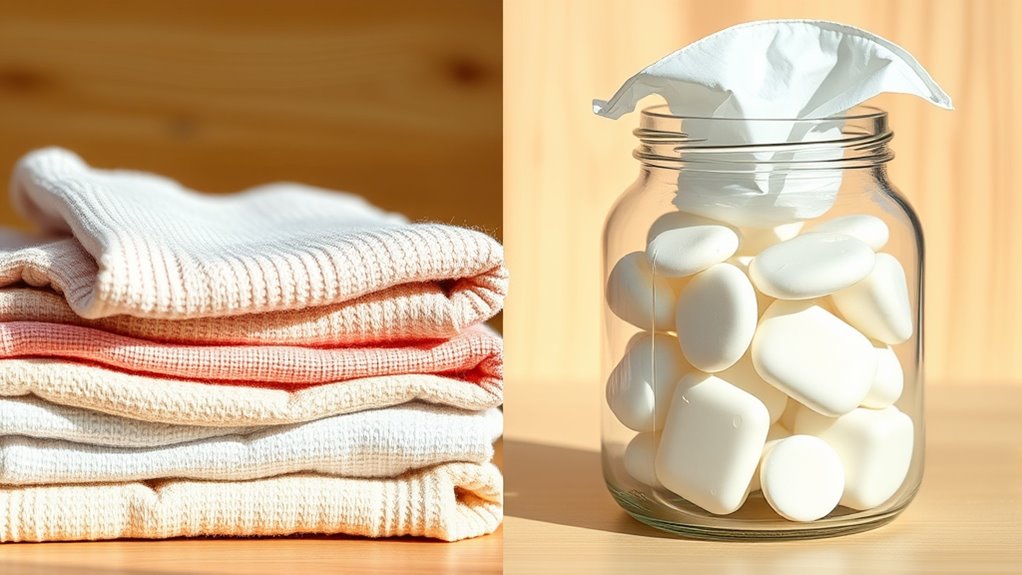
Have you ever wondered whether reusable or disposable baby wipes are the better choice for your family? When making this decision, it’s important to contemplate both the environmental impact and the cost comparison. Reusable wipes tend to be more environmentally friendly since they generate less waste over time. Unlike disposable wipes, which are single-use and often end up in landfills, reusable wipes can be washed and used repeatedly, considerably reducing the amount of trash you produce. This means fewer plastic packaging materials and less strain on waste management systems. If you’re concerned about your carbon footprint, opting for reusable wipes can be a meaningful step toward sustainability.
From a cost perspective, reusable wipes might seem pricier upfront because you need to buy a larger batch initially and invest in a washer or cleaning supplies. However, over the long run, they usually save you money. Disposable wipes, on the other hand, require continuous purchases, which can add up quickly, especially if you go through them frequently. The initial investment in reusable wipes may be higher, but if you calculate how many packs of disposables you’d buy over a year, the cost difference becomes clear. Reusable wipes are a one-time purchase for the cloths and cleaning supplies, making them more economical in the long term.
Reusable wipes save money over time despite higher initial costs.
Environmental impact is a key factor in this debate. Disposable wipes often contain synthetic fibers and chemicals, which can be harmful to the environment once they’re flushed or thrown away. Many disposable wipes are not biodegradable, meaning they take years to decompose, contributing to pollution and harming wildlife. Reusable wipes, made from natural fabrics like cotton or bamboo, decompose much faster when disposed of properly. Plus, because you wash them, you’re not adding to the cycle of waste and pollution associated with single-use products.
Considering the cost comparison, it’s also worth noting that reusable wipes reduce the demand for packaging and shipping, further diminishing their environmental footprint. They also allow you to control what cleaning agents you use, avoiding harsh chemicals found in some disposable wipes. On the flip side, disposable wipes are convenient and require no prep, which can be appealing during busy times. But if you’re aiming to make a more eco-conscious choice and save money in the long run, reusable wipes are a smart option. They might require a little more effort, but their benefits for the planet and your wallet make them worth contemplating.
Frequently Asked Questions
Are Reusable Wipes More Effective at Cleaning Than Disposables?
Reusable wipes can be more effective at cleaning because you can choose thicker, more absorbent materials that enhance cleaning efficacy. They often remove residue better since you can customize how you wash and prep them, ensuring thorough residue removal. Plus, their gentle, natural fabrics can better lift dirt and moisture, making them a reliable option for cleaning your baby’s delicate skin. Just remember to wash them regularly for peak performance.
How Do Reusable Wipes Impact Baby’s Skin Sensitivity?
Think of your baby’s skin as a delicate garden, needing gentle care. Reusable wipes, when made from soft, natural fabrics, can minimize skin irritation and reduce allergy risk, unlike harsh disposable wipes. They allow you to control ingredients and avoid chemicals that may cause sensitivity. However, improper cleaning can lead to bacteria buildup, so always wash them thoroughly. With proper care, reusable wipes can be a gentle, eco-friendly option for sensitive skin.
What Are the Long-Term Environmental Benefits of Reusable Wipes?
By choosing reusable wipes, you support sustainable manufacturing and reduce waste, which benefits the environment long-term. These wipes are made from eco-friendly materials that lessen pollution and conserve resources. Over time, your decision helps decrease landfill buildup and lowers your carbon footprint. So, you’re actively contributing to a healthier planet, making a positive impact for future generations while also providing gentle care for your baby’s skin.
Can Reusable Wipes Be Used for Other Household Cleaning Tasks?
You can definitely turn reusable wipes into your household cleaning superheroes. Think of them as versatile warriors, ready for multi-purpose use around your home. You can use them to wipe down countertops, clean mirrors, or even scrub sticky spots on floors. Just toss them in the laundry after each use, and they’re ready for the next mission. Reusable wipes are your eco-friendly, multi-purpose allies in keeping your house sparkling clean and sustainable.
Do Reusable Wipes Require Special Storage or Handling?
You should store reusable wipes in a clean, dry container with a lid to keep them hygienic. Use storage solutions like a dedicated bin or wet bag for easy access. You’ll need to wash them regularly, ideally after each use or daily, to maintain cleanliness. Proper handling includes rinsing or pre-washing if needed, and ensuring they’re fully dry before reuse to prevent mold or bacteria growth.
Conclusion
Choosing reusable baby wipes can seem like extra effort, but they’re eco-friendly and gentle on your baby’s skin. Sure, they require washing, but it’s a small price for reducing waste and saving money over time. Plus, you can trust they’re free from harsh chemicals found in some disposables. Ultimately, investing in reusable wipes helps you care for your baby and the planet—so go ahead, make the greener choice with confidence.
